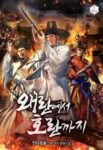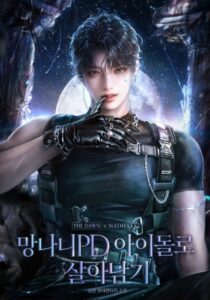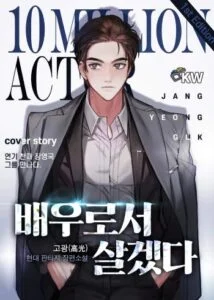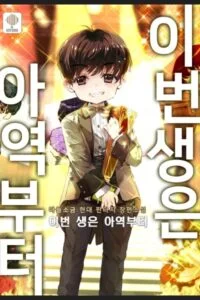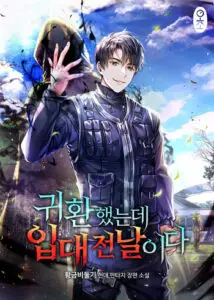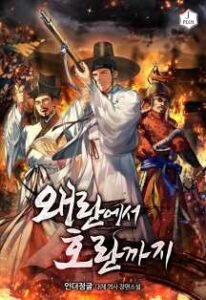Extorting Seonjo
The sulfur loaded onto The Nobleman was transported to the military supply office for gunpowder production.
This was done under Seonjo’s directive, as he wanted to conceal the trade information from court officials.
There must have been some complicated “adult matters” at play.
After confirming the sulfur I procured, Seonjo summoned me to the palace the next day.
“Yes, I have heard from the Right State Councilor that you went to Japan to acquire sulfur.”
“I am deeply honored.”
“I heard you spent a lot of resources to obtain the sulfur this time?”
“How could I spare resources when it is for the protection of the nation?”
“You are truly a loyal subject. If only the court officials were like you or the Right State Councilor…”
Seeing Seonjo offer such lip service, it seemed the sulfur was indeed urgently needed.
“The people under Your Majesty’s reign are content and sing of a peaceful era; how could the court officials be lacking?”
“Oh, is that truly so?”
In reality, I was unaware of Joseon’s situation after the Nitanggae Rebellion.
It was probably quite unstable.
According to Yi I, Joseon expended resources beyond its capacity to suppress the Nitanggae Rebellion.
To meet these financial needs, it was likely that excessive taxation was imposed on the people.
However, with the recent increase in food from fishing and the rise in agricultural productivity due to fertilizers, the nation’s finances had reportedly become sustainable without the need for additional levies.
Perhaps the “adult matters” involving the cessation of trade with Japan also reflected a shift in Joseon’s stance because of these circumstances.
“I have not been to the north yet, but in the Hasando region, there have been consecutive bountiful harvests, and there are no starving people among the populace.”[1]
“That is truly fortunate.”
“I, too, will do my utmost if it benefits the nation.”
“If that is the case, could you resolve my concern?”
“Please, tell me anything.”
“After the Nitanggae Rebellion last year, the power of the Seungja Chongtong was proven, but now that we have distributed it, we lack the gunpowder to use with it, don’t we?”
Gunpowder?
It seemed I could procure gunpowder sooner than expected.
Joseon was truly a nation serious about firepower.
The very thought of creating a crazy weapon like the Daejanggun jeon, which was unprecedented at the time, showed Joseon’s love for firepower.[2]
In fact, this love for firepower greatly aided Joseon during the Imjin War.
During the Battle of Angolpo, Kuki Yoshitaka kept the Daejanggun jeon that hit his flagship as a family heirloom.
The problem was that the most essential thing to use such advanced weaponry was none other than gunpowder!
And in Joseon, the only way to obtain potassium nitrate, a component of gunpowder, was through refining saltpeter naturally produced as the population increased.
Although they reportedly created saltpeter fields, producing saltpeter from these fields required a lot of labor and yielded little potassium nitrate.
In other words, it was labor-intensive with little return, making it inefficient.
However, directly mining saltpeter was different.
The regions where saltpeter could be mined were China and India.
But in China, the distribution of saltpeter was managed by the state, making it impossible for Joseon to obtain it from the Ming Dynasty.
Moreover, the current emperor was one known as the “Awakened Wanli Emperor.”
The Ming Dynasty, like Joseon, was a bureaucratic powerhouse, but its top executive was on strike.
Joseon might not even be able to send an envoy because of the chaos there.
Thinking about it, the geopolitical situation in Northeast Asia seemed as chaotic now as it was in the future.
A striking emperor, a bastard king, and a war-crazed regent—what a mad era!
“Gunpowder, huh…”
The problem was whether I could procure gunpowder.
If I made false promises here, my family could be ruined.
But if I told Seonjo, “Ah, that’s a bit…,” then I could be swept away with the Easterners in the Year of the Rat.
“I am sorry to say, but since Japan’s Sengoku period has not ended, there is a high possibility that gunpowder is being used as a strategic material.”
“Is that so?”
Seonjo’s eyes seemed to say, “I am disappointed.”
Fuck, were you considering reincarnating as a battalion commander in your next life, human?
At least for now, what I needed was to prove my capabilities.
If it was difficult to procure gunpowder in the Kyushu region due to the war, there might be another way.
“However, if we bring something that might entice them, we might be able to obtain it.”
“Something enticing? Well, Japan has always valued Joseon’s goods highly.”
Ah, there was something among Joseon’s goods that the Japanese couldn’t resist.
16th Century Semiconductors
In the 21st century, the industry where capital and technology were concentrated was the semiconductor industry.
The semiconductor industry was called the rice of the 21st-century industry, for its ability to influence all sectors.
In the 16th century, there was also an industry that required such capital and technology.
Amusingly, 16th-century Joseon was a leader in this industry.
The industry in question was ceramics!
Ceramics generally referred to both earthenware and porcelain. However, unlike earthenware, which was fired at low temperatures, porcelain required kilns capable of withstanding high temperatures of up to 1400 degrees, as well as a specialized glazing process and materials like kaolin.
And the Japanese, lacking the technology to make porcelain, were at a point where they were crazy about Joseon’s porcelain.
Some daimyo even said they wouldn’t trade their castles for a teacup.
The Imjin War was also known as the Seven-Year War or the Ceramic War, highlighting the Japanese obsession with porcelain.
“This is the warehouse where the ceramics produced by the artisans of Gongyasa are stored.”
When the warehouse was opened, ceramics were neatly organized on the shelves.
“Indeed, they are worthy of being called the works of Joseon’s finest artisans.”
The ceramics in the Joseon royal family’s collection were as flawless as dishes made in the 21st century, with no rough edges.
Even the subtle bamboo and plum blossom patterns resembled the Four Gentlemen that Joseon nobles adored.[3]
Was this really made by hand?
In the 16th century?
With technology that surpassed 500 years?
Wasn’t it astonishing?
These should be considered art pieces.
My impression of these artworks could be summed up in one sentence: Engineers, then and now, are being worked to the bone.
“Why the expression?”
“The problem is whether the Japanese will recognize the value of such high-priced items.”
No matter how good an item was, if it didn’t suit the buyer’s taste, it could be worthless.
Of course, the ceramics supplied to the Joseon royal family would be masterpieces in the eyes of the Japanese.
However, even the cheap ceramics circulating in Joseon were considered the finest works in the eyes of the Japanese pirates.
So why would we give them something even better?
If we started distributing these high-priced ceramics now, the pirates’ expectations would rise too high, making it difficult to sell “mid-range” products.
Luxury goods were meant to be rare to truly be valued!
To sell these high-priced items at their true value, we needed to make the pirates aware of how extraordinary these items are.
“Hmm, that makes sense. Even I hadn’t thought of that. What should we do about this?”
Even a genius could fall from a tree.
No, it was more accurate to say this was an error stemming from a lack of experience.
Given that Yi I’s family was so prestigious, they must have always used the best without any hardship.
Naturally, they were likely ignorant of the low-end market.
“Instead, please give me the tiger pelts recently captured. I need to sell them at the market in Hanyang. Is that possible?”
“His Majesty said he could even support it with the royal treasury.”
Oh, the royal treasury!
It’s the pocket money the king of Joseon could use at his discretion.
To offer even that?
Then it was only right to repay the favor, wasn’t it?
Seonjo’s Royal Treasury
The power of the card that Seonjo handed me was absolute.
By Yi I’s order, the palace guards handed over the piled-up tiger pelts to me.
Recently, it seemed the tiger hunters had been quite successful, as one side of the warehouse was filled with tiger pelts.
If they were left as is, they would be stored for years and then offered as tribute to Ming, but I couldn’t just watch that happen.
If the hemp-cotton fabric I used before was like paper money, then these pelts were at least as valuable as checks.
One roll of hemp-cotton fabric was worth about half a seok of white rice, but a tiger pelt was said to trade for about 30 seok.
This was information from Jongil-ajeossi, who was active as a leather merchant, so it must be accurate.
Ah, it might be cheaper to leave the leather to Jongil-ajeossi…
“So, where are you planning to take these pelts?”
The cart was piled high with tiger pelts.
Anyway, tiger pelts were a popular item in Joseon that couldn’t be sold because they were not available!
That’s what Jongil-ajeossi said.
I should be able to sell them at the market.
“First, I need to find items to trade.”
Walking around the market in Hanyang with such items drew a lot of attention.
In novels, there might be officials picking fights over tiger pelts, but who was standing next to me?
At this point, I was with Yi I, who was said to be able to bring down even birds.
Moreover, the people now knew that Yi I was the official who stopped the Nitanggae Rebellion.
No one at the market dared to stand in our way.
I went to the leather merchant introduced by Jongil-ajeossi while he was staying in Hanyang.
The leather merchant dealt with animal skins like rabbit and dog skins.
“Who are you?”
“I’m here to sell tiger pelts.”
“Ti-tiger pelts?”
“If you know a merchant who deals in ceramics, bring them here. I’ll give you a piece of this leather for your travel expenses. Oh, and on your way, bring the cheapest ceramics they have.”
Seonjo’s card was omnipotent!
There was no need for me to go around looking for merchants myself.
“Ah, understood.”
In the space where the merchant disappeared, Yi I cautiously asked me.
“Is it really okay to be so wasteful?”
Oh dear!
This ajeossi was saying something dangerous!
“Your Excellency, do you know what the biggest problem in Joseon is?”
“Well…”
It was a total mess, so it was hard to pinpoint the problem.
I hadn’t tried to increase Joseon’s resources through fishing and fertilizers for no reason!
“The biggest problem in Joseon is that the economy is stagnant.”
“The economy is stagnant?”
“The economy needs to sell what is unnecessary and buy what is needed to function. But in Joseon, to get what you need, you have to cross mountains and rivers, and even then, you might not find it. Naturally, even if the people need something, they have to either solve it themselves or endure the inconvenience.”
“What does that have to do with the current situation?”
Yi I may had been born a genius of Joseon, but the economy was much more advanced in the 21st century.
This meant I had the logic to persuade Yi I about the economy!
“If I use these expensive pelts, the country’s finances may suffer, but the pelts will reach the people. Those with pelts will make necessary items or trade them for other goods. Especially items like tiger pelts will flow to high-ranking officials rather than being used directly by the people. High-ranking officials will buy pelts by giving the people great wealth. The grain rotting in the officials’ warehouses will flow to the people, naturally reducing the power of the officials while providing food to the people. Once this cycle is complete, fewer items will be wasted, and the people of Joseon will become wealthier as they can obtain the items they desire.”
Wasn’t this proven by history?
To overcome the Great Depression, FDR actively intervened in the market (New Deal).
As a result, the U.S. was able to escape the mire of the Great Depression faster than anyone else.
Using just a part of the royal treasury wouldn’t activate the economy, but it could have the effect of a drop of ink on a blank page.
“Indeed, if it goes like this, the wealth held by the nobility will flow to the people. But your argument isn’t without flaws.”
“However, isn’t it of no help to the country?”
Yi I strangely hit the nail on the head, but even this could be refuted!
“The reason the country collects taxes is to protect the royal shrine and the altars, but also to aid the people when disaster strikes, isn’t it? But if their warehouses are full of grain, there’s no need for the country to help them.”
“Now that you mention it, that makes sense. But if you tell this story to other ministers, it might be dangerous.”
For now, I need to see if things really go as this friend says. Perhaps within today’s conversation lies the key to changing Joseon.
[1] Hansando is an island in South Gyeongsang Province.
[2] The name “Daejanggun” (대장군) translates to “great general,” while “jeon” (전) refers to an arrow. Put together, “Daejanggun jeon” literally means the “Great General’s Arrow.”
[3] The Four Gentlemen (사군자, “sagunja”) refer to four plants that symbolize noble virtues: plum blossoms (매화), orchids (난초), bamboo (대나무), and chrysanthemums (국화). These plants were admired by scholars in Joseon for their association with Confucian ideals: resilience, modesty, integrity, and perseverance

